
| [Home] [Table of Contents] [Lear's Nonsense Books] [Nonsense Songs...] | |
|
|
|
 |
The History of the
|
|
|
|
|
CHAPTER I In former days -- that is to say, once upon a time, there lived in the Land of Gramblamble, Seven Families. They lived by the side of the great Lake Pipple-popple (one of the Seven Families, indeed, lived in the Lake), and on the outskirts of the City of Tosh, which, excepting when it was quite dark, they could see plainly. The names of all these places you have probably heard of, and you have only not to look in your Geography books to find out all about them. Now the Seven Families who lived on the borders of the great Lake Pipple-popple, were as follows in the next Chapter.
CHAPTER II There was a Family of Two old Parrots and Seven young Parrots.
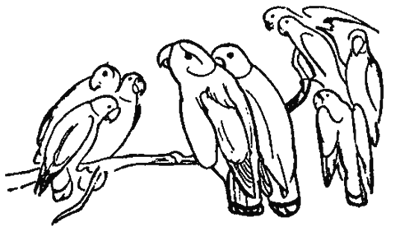 There was a Family of Two old Storks and Seven young Storks.
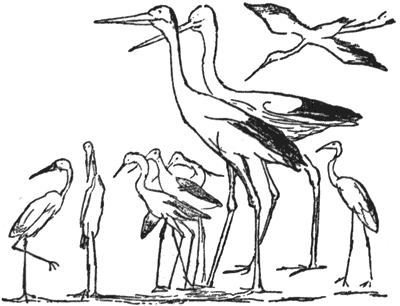 There was a Family of Two old Geese, and Seven young Geese.
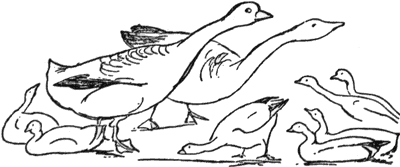 There was a Family of Two old Owls, and Seven young Owls.
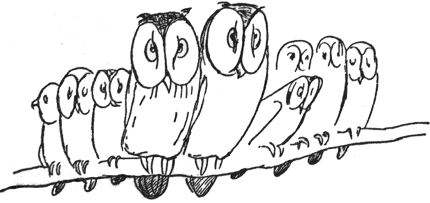 There was a Family of Two Old Guinea Pigs and Seven young Guinea Pigs.
 There was a Family of Two old Cats and Seven young Cats,
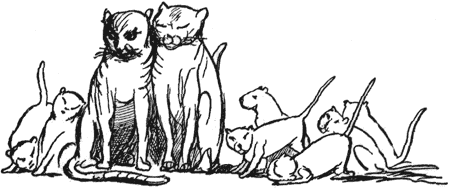 And there was a Family of Two old Fishes and Seven young Fishes.

CHAPTER III The Parrots lived upon the Soffsky-Poffsky trees, -- which were beautiful to behold, and covered with blue leaves, -- and they fed uponfruit, artichokes, and striped beetles. The Storks walked in and out of the Lake Pipple-popple, and ate frogs for breakfast and buttered taost for tea, but on account of the extreme length of their legs, they could not sit down, and so they walked about continually. The Geese, having webs to their feet, caught quantities of flies, which they ate for dinner. The Owls anxiously looked after mice, which they caught and made into sago puddings. The Guinea Pigs toddled about the gardens, and ate lettuces and Cheshire cheese. The Cats sate still in the sunshine, and fed upon sponge biscuits. The Fishes lived in the Lake, and fed chiefly on boiled periwinkles. And all these Seven Families lived together in the utmost fun and felicity.
CHAPTER IV One day all the Seven Fathers and the Seven Mothers of the Seven Families agreed that they would send their children out to see the world. So they called them all together, and gave them each eight shillings and some good advice, some chocolate drops, and a small green morocco pocket-book to set down their expenses in. They then particularly entreated them not to quarrel, and all the parents sent off their children with a parting injunction. 'If,' said the old Parrots, 'you find a Cherry, do not fight about who should have it.' 'And,' said the old Storks, 'if you find a Frog, divide it carefully into seven bits, but on no account quarrel about it.' And the old Geese said to the Seven young Geese, 'Whatever you do, be sure you do not touch a Plum-pudding Flea.' And the old Owls said, 'If you find a Mouse, tear him up into seven slices, and eat him cheerfully, but without quarrelling.' And the old Guinea Pigs said, 'Have a care that you eat your Lettuces, should you find any, ot greedily but calmly.' And the old Cats said, 'Be particularly careful not to meddle with a Clangle-Wangle, if you should see one.' And the old Fishes said, 'Above all things avoid eating a blue Boss-woss, for they do not agree with Fishes, and give them pain in their toes.' So all the Children of each Family thanked their parents, and making in all forty-nine polite bows, they went into the wide world.
CHAPTER V The Seven young Parrots had not gone far, when they saw a tree with a single Cherry on it, which the oldest Parrot picked instantly, but the other six, being extremely hungry, tried to get it also. On which all the Seven began to fight, and they scuffled,
screamed, and shrieked, and squealed, and squeaked, and clawed, and snapped, and bit, and bumped, and thumped, and dumped, and flumped each other, till they were all torn into little bits, and at last there was nothing left to record this painful incident, except the Cherry and seven small green feathers. And that was the vicious and voluble end of the Seven young Parrots.
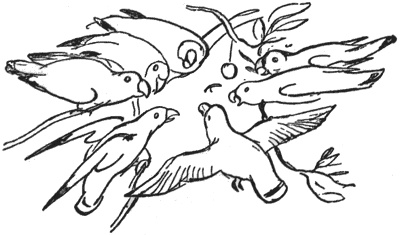
CHAPTER VI
When the Seven young Storks set out, they walked or flew fo fourteen weeks in a straight line, and for six weeks more in a crooked one; and after that they ran as hard as they could for one hundred and eight miles: and after that they stood still and made a himmeltanious chatter-clatter-blattery noise with their bills. About the same time they perceived a large Frog, spotted with green, and with a sky-blue stripe under each ear. So being hungry, they immediately flew at him, and were going to divide him into seven pieces, when they began to quarrel as to which of his legs should be taken off first. one said this, and another said that, and while they were all quarrelling the Frog hopped away. And when they saw that he was gone, they began to chatter-clatter:
more violently than ever. And after they had fought for a week they pecked each each other all to little pieces, so that at last nothing was left of any of them except their bills, And that was the end of the Seven young Storks.
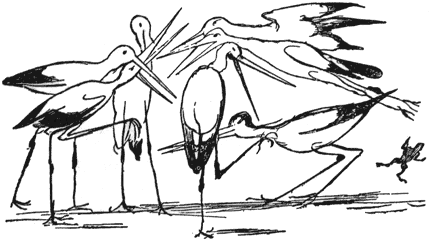
CHAPTER VII
When the Seven young Geese began to travel, they went over a large plain, on which there was but one tree, and that was a very bad one. So four of them went up to the top of it, and looked about them, while the other three waddled up and down, and repeated poetry, and their last six lessons in Arithmetic, Geography, and Cookery. Presently they perceived, a long way off, an object of the most interesting and obese appearance, having a perfectly round body, exactly resembling a boiled plum-pudding, with two little wings, and a beak, and three feathers growing out of his head, and only one leg. So after a time all the Seven young Geese said to each other, 'Beyond all doubt this beast must be a Plum-pudding Flea!' On which they uncautiously began to sing aloud, 'Plum-pudding Flea, And no sooner had they sung this verse then the Plum-pudding Flea began to hop and skip on his one leg with the most dreadful velocity, and came straight to the tree, where he stopped and looked about him in a vacant and voluminous manner. On which the Seven young Geese were greatly alrmed, and all of a tremble-bemble: so one of them put out his great neck, and just touched him with the tip of his bill, -- but no sooner had he done this than the Plum-pudding Flea skipped and hopped about more and more and higher and higher, after which he opened his mouth, and, to the great surprise and indignation of the Seven Geese, began to bark so loudly and furiously and terribly that they were totally unable to bear the noise, and by degrees every one of them suddenly tumbled down quite dead. So that was the end of the Seven young Geese.
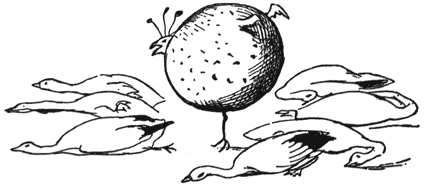
CHAPTER VIII
When the Seven young Owls set out, they sate every now and then on the branches of old trees, and never went far at one time. And one night when it was quite dark, they thought they heard a Mouse, but as the gas lights were not lighted, they could not see him. So they called out, 'Is that a Mouse?' On which a Mouse answered, 'Squeaky-peeky-weeky, yes it is.' And immediately all the young Owls threw themselves off the tree, meaning to alight on the ground; but they did not perceive that there was a large well below them, into which they all fell superficially, and were every one of them drowned in less than half a minute. So that was the end of the Seven young Owls.
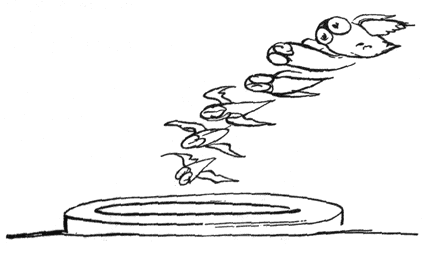
CHAPTER IX
The Seven young Guinea Pigs went into a garden full of Gooseberry-bushes and Tiggory-trees, under one of which they fell asleep. When they awoke, they saw a large Lettuce which had grown out of the ground while they had been sleeping, and which had an immense number of green leaves. At which they all exclaimed:
And instantly the Seven young Guinea Pigs rushed with such extreme force against the Lettuce-plant, and hit their heads so vividly against its stalk, that the concussion brought on directly an incipient transitional inflammation of their noses, which grew worse and worse and worse and worse till it incidentally killed them all Seven. And that was the end of the Seven young Guinea Pigs.
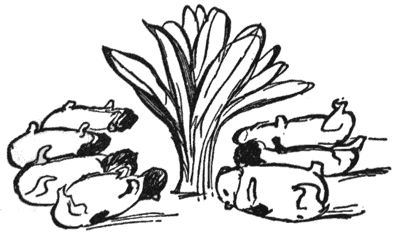
CHAPTER X
The Seven young Cats set off on their travels with great delight and rapacity. But, on coming to the top of a high hill, they perceived at a long distance off a Clangle-Wangle (or, as it is more properly written, Clangel-Wangel), and in spite of the warning they had had, they ran straight up to it. (Now the Clangle-Wangle is a most dangerous and delusive beast, and by no means commonly to be met with. They live in the water as well as on land, using their long tail as a sail when in the former element. Their speed is extreme, but their habits of life are domestic and superfluous, and their general demeanour pensive and pellucid. On summer evenings they may sometimes be observed near the Lake Pipple-popple, standing on their heads and humming their national melodies: they subsist entirely on vegetables, excepting when they eat veal, or mutton, or pork, or beef, or fish, or saltpetre.) The moment the Clangle-Wangle saw the Seven young Cats approach, he ran away; and as he ran straight on for four months, and the Cats, though they continued to run, could never overtake him, -- they all gradually died of fatigue and of exhaustion, and never afterwards recovered. And this was the end of the Seven young Cats.

CHAPTER XI
The Seven young Fishes swam across the Lake Pipple-popple, and into the river, and into the Ocean, where most unhappily for them, they saw on the 15th day of their travels, a bright blue Boss-Woss, and instantly swam after him. But the Blue Boss-Woss plunged into a perpendicular,
where in fact his house was. And the Seven young Fishes, swimming with great uncomfortable velocity, plunged also into the mud quite against their will, and not being accustomed to it, were all suffocated in a very short period. And that was the end of the Seven young Fishes.

CHAPTER XII
After it was known that the
were all dead, then the Frog, and the Plum-pudding Flea, and the Mouse, and the Clangel Wangel, and the Blue Boss Woss, all met together to rejoice over their good fortune. 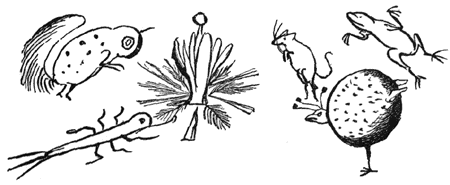
CHAPTER XIII
But when the two old Parrots,
CHAPTER XIV
And after this, they filled the bottles with the ingredients for pickling, and each couple jumped into a separate bottle, by which effort of course they all died immediately, and become thoroughly pickled in a feew minutes; having previously made their wills (by the assistance of the most eminent Lawyers of the District), in which they left strict orders that the Stoppers of the Seven Bottles should be carefully sealed up with the blue Sealing-wax they had purchased; and that they themselves in the Bottles should be presented to the principal museum of the city of Tosh, to be labelled with Parchment or any other anticongenial succedaneum, and to be placed on a marble table with silver-gilt legs, for the daily inspection and contemplation, and for the perpetual benefit of the pusillanimous public. And if ever you happen to go to Gramble-Blamble, and visit that museum in the city of Tosh, look for them on the Ninety-eighth table in the Four handred and twenty-seventh room of the right-hand corridor of the left wing of the Central Quadrangle of that magnificent building; for if you do not, you certainly will not see them.
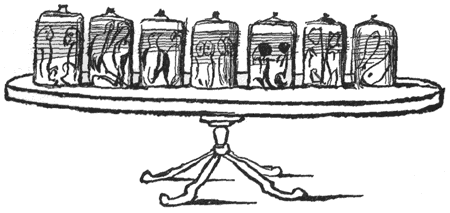 |
|
|
|
[Home] [Table of Contents] [Lear's Nonsense Books] [Nonsense Songs...] |
|
|
 |
There was an Old Derry down Derry...
|